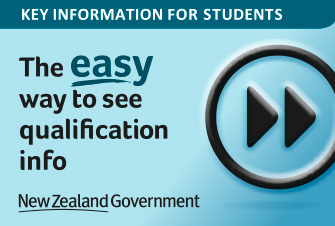General academic admission
a) Candidates are required to have:
i) NCEA Level 3 comprised of 60 credits at NCEA Level 3 or above and 20 credits at NCEA Level 2 or above, including:
(1) 14 credits each at NCEA Level 3 in three approved subjects; and
(2) Literacy (10 credits at NCEA Level
2 or above made up of 5 credits each in reading and writing); and
(3) Numeracy (10 credits at NCEA Level 1 or above);
OR
ii) A minimum of 60 credits at NCEA Level 2 across four subjects (15 credits per subject) including English and a Science subject or Physical Education.
(1) In addition candidates are required to have gained a minimum of 14 credits at
Level 1 or higher in Mathematics or Pāngarau on the New Zealand Qualifications Framework (NZQF),
(2) plus a minimum of 8 credits at Level 2 or higher in English or Te Reo Māori, 4 credits of which must be in Reading and 4 credits
in Writing;
OR
iii) An equivalent or relevant level 4 qualification as approved by the Team Manager or delegated authority.
UE 2020
Applicants who achieved University Entrance through NCEA in 2020 will be assessed under separate NZQA entry requirements that take into account the impacts of COVID-19. Candidates are required to have:
- NCEA Level 3 comprised of 60 credits at NCEA Level 3 or above and 20 credits at NCEA Level 2 or above, including:
- 12 credits each at NCEA Level 3 in three approved subjects; and
- UE Literacy (10 credits at NCEA Level 2 or above made up of 5 credits each in reading and writing); and
- UE Numeracy (10 credits at NCEA Level 1 or above).
Special admission
Domestic applicants aged 20 years or above who have not met the General Admission or entry requirements for a programme but whose skills, education or work experience indicate that they have a reasonable chance of success may be eligible for
Special Admission. Special admission will be granted at the discretion of the relevant Head of School/Centre Director or designated
nominee. Such applicants may be required to successfully complete a foundation, bridging or tertiary
introductory programme as a condition of entry into higher level programmes.
Provisional entry
Domestic applicants aged under 20 years who have not met the general academic admission and entry criteria for a programme but who can demonstrate a reasonable chance of success through other educational attainment and/or work or life experience
may be eligible for provisional entry at the discretion of the relevant Head of School/Centre Director or designated nominee. Provisional entry places restrictions on re-enrolment to be lifted if the applicant’s performance is
deemed satisfactory by the relevant Head of School/Centre Director or designated nominee.
First Aid requirements
Students enrolled in this programme must hold, or be working towards, a current first aid certificate (covering NZQA units 6401 and 6402) for the duration of their enrolment.
English language requirements
Candidates who have English as a second language are required to have an International English Language Test System (IELTS) score of 6.0, with no individual band score lower than 5.5; or equivalent.
Safety checks
In order to comply with the provisions of the Vulnerable Children’s Act, 2014 and Child Protection Policies for all ‘specified organisations’ providing a ‘regulated service’, all candidates/students will be subjected to
safety checks. These will include but are not limited to;
- A Formal interview
- Referee checks
- A police vet check
- A risk assessment
Any unsatisfactory result arising from the full safety checking process may result in the candidate/student being precluded/declined entry or withdrawn from the programme of study. Furthermore, students must declare any pending or new convictions
arising during any stage throughout the entire enrolment period. A conviction or failure to declare a conviction may also result in the student being immediately withdrawn from the programme.




